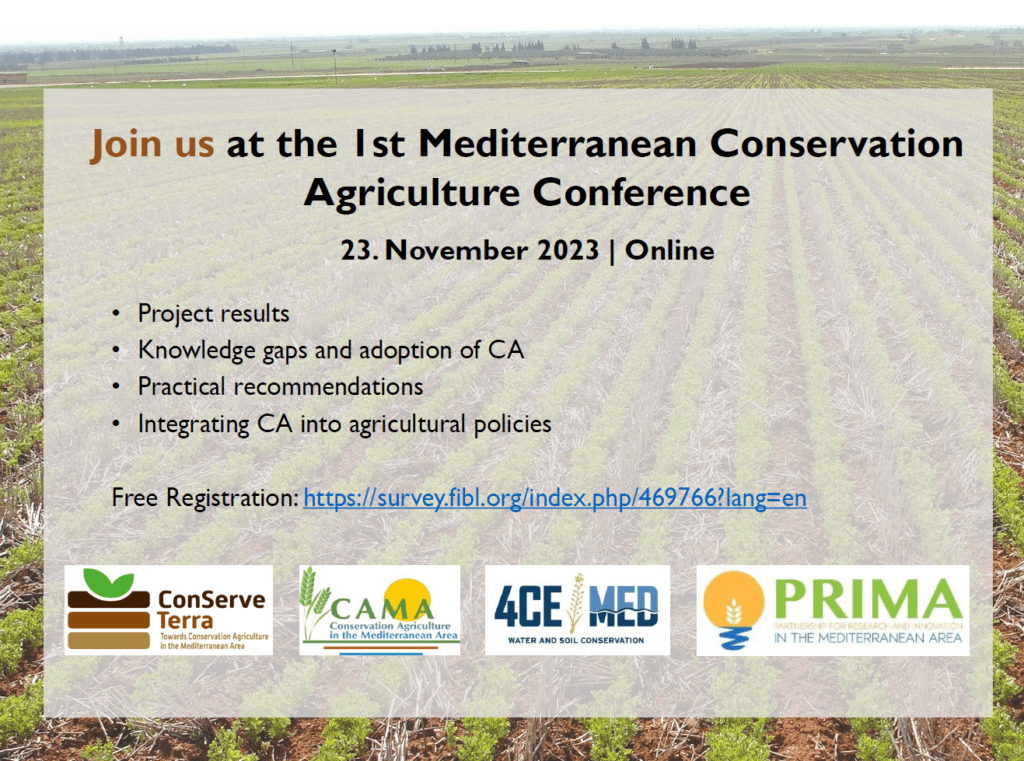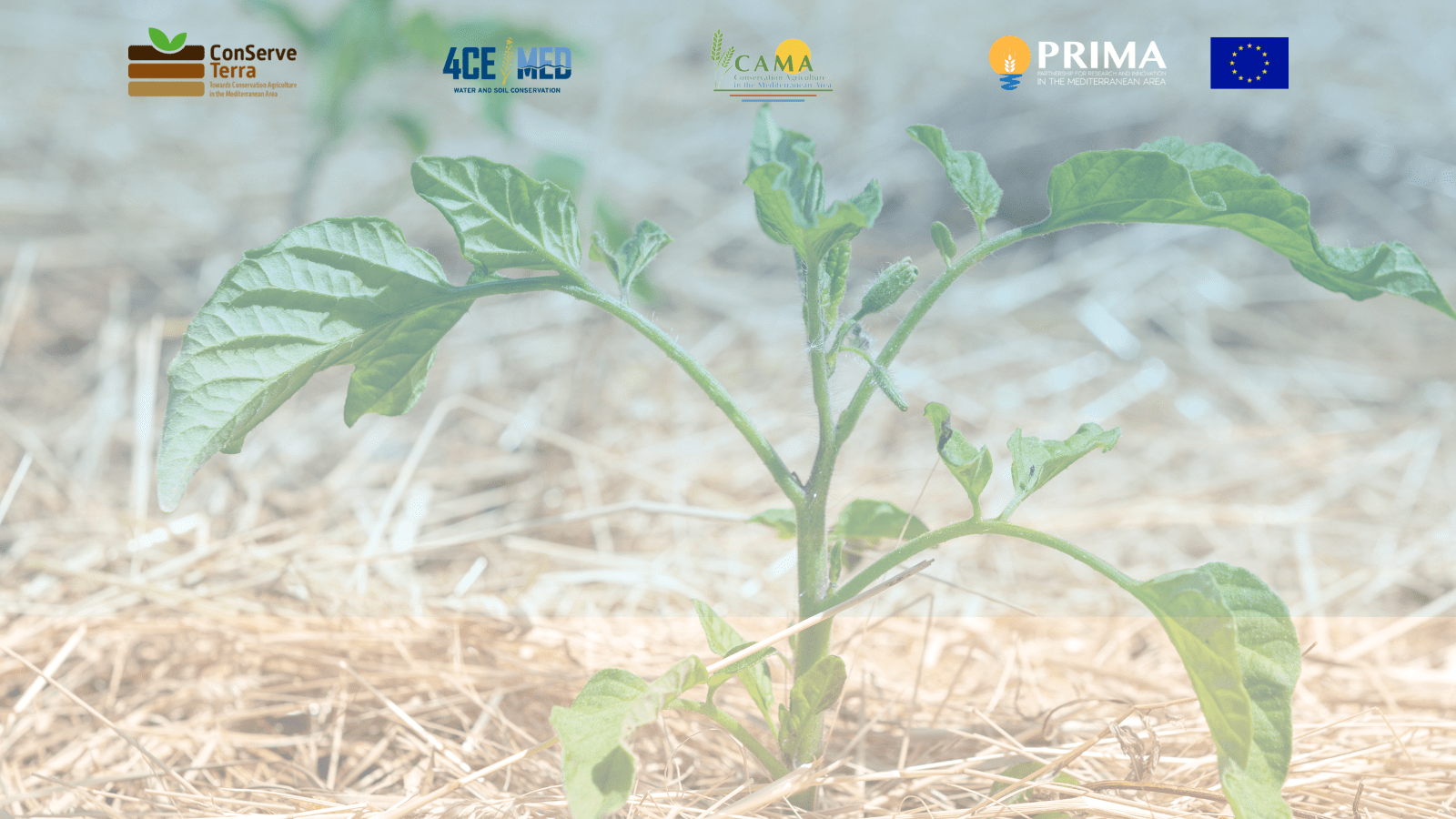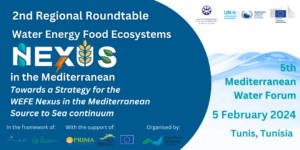The first-ever Mediterranean Conservation Agriculture Conference is set to take place on 23rd November.
What makes this event special? It’s organized by three PRIMA projects, ConserveTerra, CAMA, and 4CEMed.
Fabrice Dentressangle, PRIMA Project officer, welcomes this joint initiative:
“I am glad to witness the organization of this 1st conference, which is a result of a fruitful collaboration among 3 PRIMA projects. These 3 projects are entirely in line with the PRIMA spirit of sharing and promoting collaborations and exchanges around the Med basin. The significant challenges faced in terms of water scarcity and sustainable production of food in a region severely affected by climate change cannot be effectively addressed in isolation. For this reason, I really thank these consortiums for having fully integrated this critical aspect into the DNA of their projects. Collaborations have the power to amplify the spread of knowledge and the adoption of new practices by mutualizing results, optimizing the use of resources and finally generating fundamental changes on the ground that are crucial for ensuring a better future for our region and beyond.”
Conservation Agriculture
According to the definition established by FAO: “Conservation Agriculture (CA) is a farming system that can prevent losses of arable land while regenerating degraded lands. It promotes maintenance of a permanent soil cover, minimum soil disturbance, and diversification of plant species. It enhances biodiversity and natural biological processes above and below the ground surface, which contribute to increased water and nutrient use efficiency and to improved and sustained crop production.”
The Mediterranean region, with its unique challenges and opportunities, is not immune to the demands of sustainable agriculture. To address these concerns, the three PRIMA projects are coming together to offer a platform for open discussions with farmers, policymakers, and experts. These discussions will revolve around strategies for promoting conservation agriculture and addressing knowledge gaps in the field. In addition, there will be roundtable discussions during which farmers will share their field experiences and ideas on conservation agriculture.
One of the conference’s objectives is to explore the integration of conservation agriculture into agricultural policies. Policymakers, researchers, and practitioners will engage in discussions about how these principles can be incorporated into the region’s agricultural policies to ensure long-term sustainability.
Conservation Agriculture is not just a set of principles; it’s a holistic approach to farming that has the potential to reshape agricultural landscapes and land use practices. By focusing on preserving and regenerating the land while maintaining a balance with natural biological processes, it offers a promising path toward a more sustainable and productive future.
Register here: https://survey.fibl.org/index.php/469766?lang=en

Cultivating Resilience: PRIMA Projects Leading the Way in Climate Change Adaptation and Mitigation
Conservation agriculture plays a crucial role in climate change adaptation and mitigation by promoting sustainable farming practices that improve soil health, water management, and crop resilience, ultimately reducing the environmental impact of agriculture while increasing its capacity to withstand climate-related challenges.
The three PRIMA projects, ConserveTerra, CAMA, and 4CEMed spearhead efforts to adapt farming systems to the challenges posed by our evolving climate.
The 4CE-MED project focuses on creating resilient, diversified farming systems in the Mediterranean region, including minimal soil disturbance, permanent organic soil cover, and crop diversification. It integrates camelina, an oilseed crop, as a cash cover crop to enhance soil and water conservation, boost farmer income, and enable crop rotation.
The CAMA project aims to address adoption barriers of Conservation Agriculture (CA) in the Mediterranean region through multidisciplinary research. It will identify constraints, test adapted CA techniques in the field to measure their impact on soil conservation, water efficiency, and crop development. Data modeling will simulate CA’s long-term effects on crop growth, yield, and soil fertility. CAMA will provide technical and policy recommendations, enhance knowledge, and build capacity for researchers and practitioners to promote CA adoption in the Mediterranean.
The project ConserveTerra aims to understand farmers’ decision-making regarding soil management and conservation, enhance their soil knowledge through Farmer Field Schools, test the effectiveness of these schools in implementing conservation techniques, investigate different tillage methods, optimize weed management, and build capacity for participatory decision-making and best practices in Conservation Agriculture (CA). The ConserveTerra project not only deals with technical and physical obstacles but also delves into the mental and traditional barriers that farmers may face when transitioning to a new system. It seeks to understand and identify these mental and traditional hurdles by engaging with farmers and challenging established agricultural codes.




